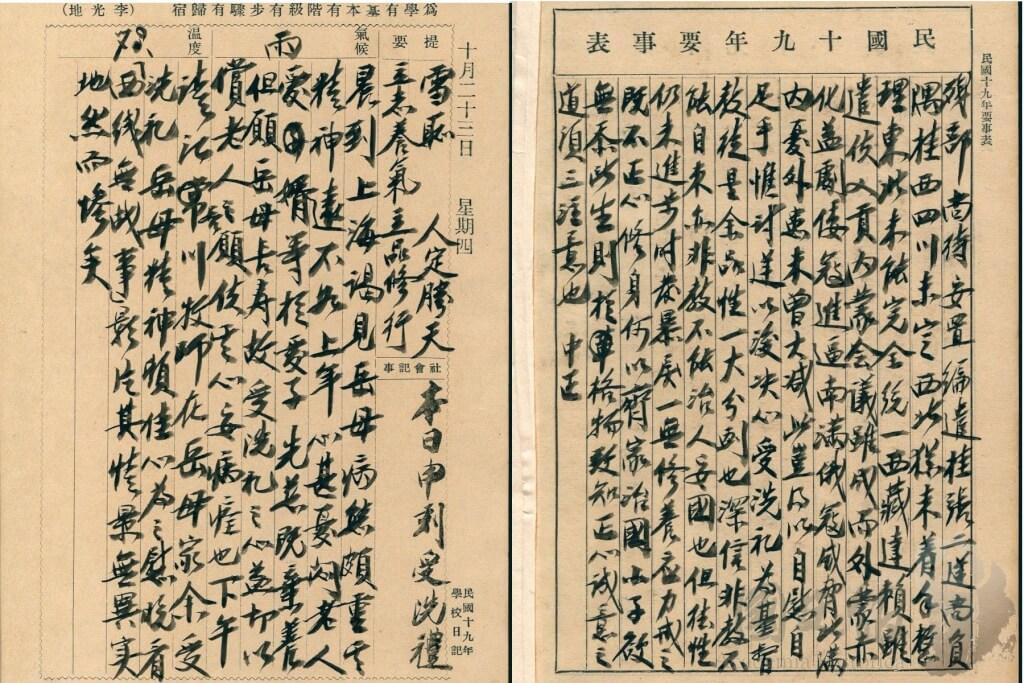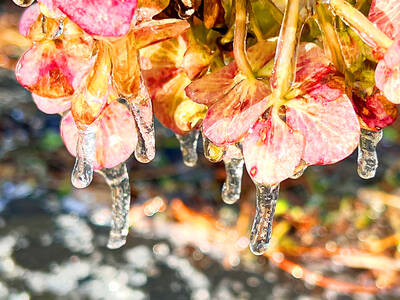Academia Historia today announced that it has published the fourth batch of diaries kept by former presidents Chiang Kai-shek (蔣介石) and Chiang Ching-kuo (蔣經國).
The diaries are part of a collection formerly kept at Stanford University that were returned to Taiwan in September last year after a long legal battle over their ownership.

Photo courtesy of Academia Historia via CNA
Since their return, Academia Historia has been digitizing them and making them publicly available in chronological order.
The fourth set materials includes Chiang Kai-shek’s diaries from 1930 to 1933, totaling 1,481 items and 2,214 digital files, and Chiang Ching-kuo’s diaries from 1943 to 1944 totaling 1,014 items and 1,253 files, Academia Historia said in a news release.
Chiang Kai-shek’s documents include one original volume and three transcribed volumes, while the Chiang Ching-kuo collection stands at two original volumes, it said.
While the items are currently accessible and searchable, they would not be available online until the copyright expires, although they can be accessed directly in Academia Historia’s reading room, it added.
Since March, 34 volumes covering 24 years and 16,138 digital files have been published.
The diaries are organized chronologically, with files clarifying whether each is a full or partial entry, if there is a missing page or if it has content that has yet to be understood.
The 1930 diaries include Chiang Kai-shek’s decision to be baptized, with him citing his mother-in-law’s illness as the motivating factor.
In addition to writing their respective diaries, both Chiangs also read one another’s entries, Academia Historia said.
Today’s batch is the earliest published so far.
Academia Historia has already published Chiang Kai-shek’s diaries from 1948 to 1972, in three groups from 1948 to 1954, 1955 to 1960, and 1961 to 1972.
It has also published Chiang Ching-kuo’s diaries from 1960 to 1969 and from 1970 to 1979.

The Taipei City Government yesterday said contractors organizing its New Year’s Eve celebrations would be held responsible after a jumbo screen played a Beijing-ran television channel near the event’s end. An image showing China Central Television (CCTV) Channel 3 being displayed was posted on the social media platform Threads, sparking an outcry on the Internet over Beijing’s alleged political infiltration of the municipal government. A Taipei Department of Information and Tourism spokesman said event workers had made a “grave mistake” and that the Television Broadcasts Satellite (TVBS) group had the contract to operate the screens. The city would apply contractual penalties on TVBS

A new board game set against the backdrop of armed conflict around Taiwan is to be released next month, amid renewed threats from Beijing, inviting players to participate in an imaginary Chinese invasion 20 years from now. China has ramped up military activity close to Taiwan in the past few years, including massing naval forces around the nation. The game, titled 2045, tasks players with navigating the troubles of war using colorful action cards and role-playing as characters involved in operations 10 days before a fictional Chinese invasion of Taiwan. That includes members of the armed forces, Chinese sleeper agents and pro-China politicians

The lowest temperature in a low-lying area recorded early yesterday morning was in Miaoli County’s Gongguan Township (公館), at 6.8°C, due to a strong cold air mass and the effect of radiative cooling, the Central Weather Administration (CWA) said. In other areas, Chiayi’s East District (東區) recorded a low of 8.2°C and Yunlin County’s Huwei Township (虎尾) recorded 8.5°C, CWA data showed. The cold air mass was at its strongest from Saturday night to the early hours of yesterday. It brought temperatures down to 9°C to 11°C in areas across the nation and the outlying Kinmen and Lienchiang (Matsu) counties,

STAY VIGILANT: When experiencing symptoms of carbon monoxide poisoning, such as dizziness or fatigue, near a water heater, open windows and doors to ventilate the area Rooftop flue water heaters should only be installed outdoors or in properly ventilated areas to prevent toxic gas from building up, the Yilan County Fire Department said, after a man in Taipei died of carbon monoxide poisoning on Monday last week. The 39-year-old man, surnamed Chen (陳), an assistant professor at Providence University in Taichung, was at his Taipei home for the holidays when the incident occurred, news reports said. He was taking a shower in the bathroom of a rooftop addition when carbon monoxide — a poisonous byproduct of combustion — leaked from a water heater installed in a poorly ventilated